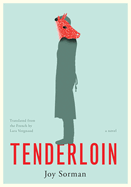
Can butchery become ballet? Is the dance of death one of romance and joy, or is it the crude swelling of muscle and a final rattle of breath before becoming mere meat? In the quixotic Tenderloin, French author Joy Sorman gives readers Upton Sinclair's The Jungle with a sprinkling of the absurdity and horror of Rachel Yoder's Nightbitch.
Pim is a skinny kid who aspires to become the best butcher in Paris. He wants money and accolades. He sees beauty in this dirty job that so few want to do, and he understands its value to the people who will pay to avoid having to do it themselves. Pim dedicates his life to the knife, to feeding people's intoxicating meat obsession, so that he can obtain a status that, eventually, he doesn't even want anymore. All Pim wants is the animal in its purest form: as a slab on his table.
Sorman's sentences swim and dive. Some are strikingly simple, while others go on for half a page but never lose readers. Sorman and her translator, Lara Vergnaud, are word magicians, and they've created a cacophonic dreamscape of power, sex, and intensity that stands on the shoulders of George Orwell's Animal Farm but is entirely its own oddity. Tenderloin peels back the layers of reverence for what we kill and what we consume. It also investigates the capitalist separation between the eater and the eaten, and the impact of that disconnect on humanity. Tenderloin is a dark, iron-drenched infestation of blood and sinew that triangulates and strangles. --Dominic Charles Howarth, book manager, Book + Bottle

